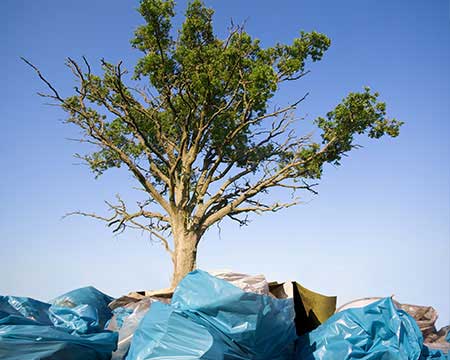
LANDFILL FREE CITIES: A CIRCULAR ECONOMY APPROACH

As per the estimates presented in Global Waste Management Outlook (GWMO 2105), the annual global urban waste generation including the municipal solid waste, commercial and industrial waste and construction and demolition waste is in the range of 7-10 billion tons of which the municipal solid waste is estimated at 2 billion tons. Much of this waste in developing and underdeveloped economies are not handled scientifically and is a cause of concern globally.
3R (Reduce, Reuse and Recycle) practices leading to adoption of circular economy provides opportunities to manage waste in a scientific manner. Putting waste material back again into production cycle or reuse/recycle and closing the loop not only avoids waste destined for disposal thus avoiding air and land pollution but also provides valuable resources to resource constrained economies. Landfills in most of the metro cities in India are in dire state and source of methane emission causes fires which result into emission of black carbon, not only from garbage burning but also from uncontrolled landfill gas emission from these sites.
Adopting circular economy can help countries achieving Sustainable Development Goal (SDG) 12: ensuring sustainable consumption and production while also addressing other SDGs. The product design aspect for longer life, use of lesser hazardous materials and ease of dismantling, refurbishment, recovery and recycling are the key aspects of circular economy which needs to be addressed and adopted by countries in the Asia Pacific to ensure decoupling of waste generation trends with economic growth aspired by these countries.
In this event we would like to explore material intensive sectors like automobile and construction and sectors like renewables, focussing on the use of solar PVs and storage batteries to examine opportunities for developing logistics for setting up waste collection centres and material recovery and recycling across the urban centres. The deliberations would also focus on maximising waste reduction opportunities and learning from peers about the best practices in these sectors and attempt closing the material use loop thus is the process ensuring the less and less waste reached landfills in the cities.
Key questions
- What are the challenges in setting up waste collection centres and material recovery/recycling centres?
- How the conflict between waste recovery and recycling and waste to energy can be addressed in Indian context?
- What would be policy blue print for maximising resource recovery and recycling thus closing the material use loop and aspiring landfill free cities? How Europe and Japan can guide Indian cities?